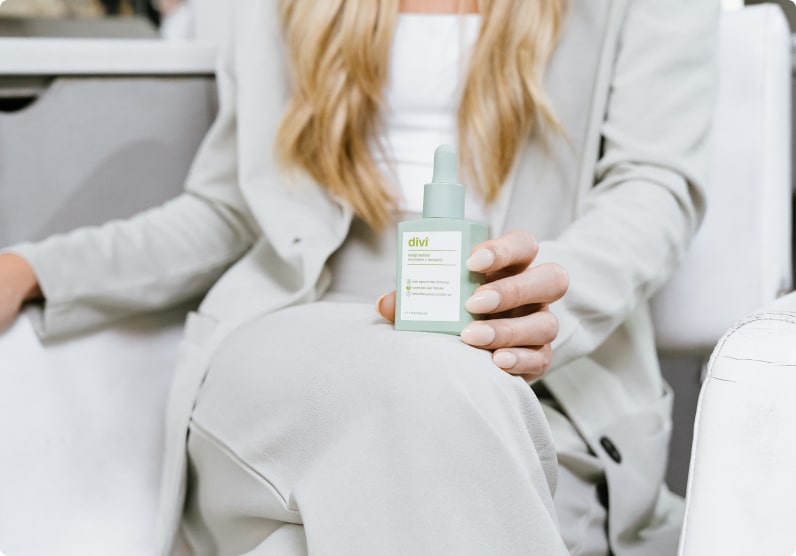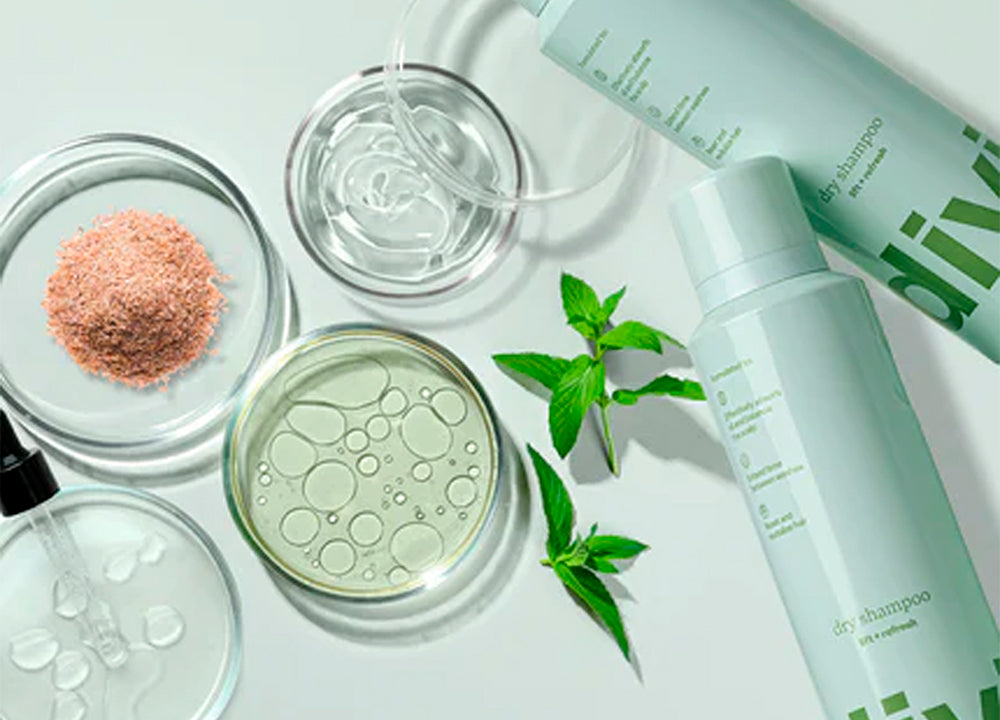Irritant contact dermatitis (ICD) is one of two main types of contact dermatitis, the other being allergic contact dermatitis.
ICD is a nonallergic skin reaction where an irritant substance damages your skin's outer protective layer, resulting in a dry, cracked and itchy skin rash.
Understanding what causes irritant dermatitis and its symptoms is key to knowing how to treat and manage it. If you suspect you have irritant dermatitis, we'll take you through the causes and how the ingredients in our scalp care products can help you manage the symptoms.
What Causes Irritant Dermatitis?
Irritant contact dermatitis is caused by repeated exposure to irritating chemicals or substances that aggravate the skin. These irritants strip the outer layer of the skin's oils and natural moisturizing factors, allowing chemical irritants to penetrate the skin barrier and cause inflammation.
“Ok, so what am I doing that's causing this irritation?” you may ask.
This is a fair question! You might be surprised to learn that substances you use daily could aggravate your irritant dermatitis. Below are some common irritants:
- Soaps and detergents
- Acids and alkalis, such as drain cleaners
- Antiseptics and antibacterials
- Cosmetic ingredients – such as fragrances, preservatives, hair dyes and nail varnishes
- Paints, varnishes or other solvents
- Body fluids, including urine and saliva
- Disinfectants and sanitizers
- Certain plants, such as poinsettias and peppers
- Water – especially heavily chlorinated water or hard, chalky water
What Are the Symptoms of Irritant Dermatitis?
Symptoms of contact dermatitis, particularly irritant dermatitis, vary from person to person. Symptom severity and length can also differ and change over time.

The factors determining the severity of ICD include how much and how intense the irritant concentration is, how long it was in contact, and how frequently you've been exposed. Severity also depends on your skin type (dry, oily, thick, thin, very fair, damaged, or possessing a pre-existing atopic tendency) and environmental factors like high or low temperature and humidity.
Some people respond to strong irritants after a single exposure, while others may develop a skin rash after multiple exposures to mild irritants like water or soap. Some people can even develop a tolerance to the offending substance(s) over time.
Irritant contact dermatitis may have symptoms such as:
- An itchy rash appearing red on lighter skin tones or dark purple on darker skin tones
- Bumps and blisters
- Swelling or hive-like
- Burning or stinging sensation
- Cracking, flaky or scaly skin due to extreme dryness
- Ulcerations or open sores that ooze and crust
- Stiff or sensitive skin to touch
Where On the Body Does Irritant Dermatitis Start?
Irritant contact dermatitis occurs in areas where harmful chemicals come into contact with the skin. Any part of the skin can be affected. The hands and feet are most commonly affected, but ICD can occur on the face and other parts of the body.
Where ICD starts will depend on which part of your body comes in contact with the irritant.
People who repeatedly work with their hands while using detergents, soaps, or nickel-containing metals can develop irritant dermatitis symptoms on their hands. Sometimes it can also affect the face when makeup is used or the scalp when hair dyes are used.
ICD is localized and does not spread. Irritating substances affect the area in contact with the skin. If a rash spreads to other parts of the body, you may have an irritant dermatitis reaction.
Who Has a Higher Risk of Developing Irritant Dermatitis?
The risk of developing irritant contact dermatitis may increase if your job involves working with irritants daily or doing a lot of work with water.
For example, mechanics, healthcare workers, janitors and cosmetologists are more likely to develop contact dermatitis. Developing the condition because of an irritant you work with may be referred to as occupational irritant dermatitis.
It has also been shown that people who have atopic dermatitis have a higher risk of developing ICD.
What Are the Complications of Irritant Contact Dermatitis?
In most cases, contact dermatitis clears up without complications within 2-3 weeks. However, it may recur if the irritant cannot be identified or avoided. Complications may arise from repeated exposures, no treatment, and environmental factors like humidity or low/high temperatures.
Contact dermatitis can become infected if the affected area is repeatedly scratched, causing it to ooze or become wet. This creates a suitable space for bacteria or fungi to grow, which can lead to infection.
How Do You Treat Irritant Dermatitis?
You must avoid repeat exposure to the irritant substance to prevent this type of contact dermatitis. If you can identify the substance causing the reaction and avoid future contact, your symptoms should clear up without causing any complications.
There are some practical ways you can treat ICD. Below are the top picks based on science and clinical studies.
Divi's Scalp Serum
If you have irritant dermatitis on your scalp, why not try Divi's Scalp Serum? It contains a carefully formulated blend of clean ingredients to combat the causes of this uncomfortable condition. We’ve listed three of those ingredients below and how they can address irritant dermatitis:
- Menthol – Menthol may provide antipruritic and anesthetic relief, reducing itch as nerve fibers that transmit the cold sensation are stimulated, with the menthol acting as a coolant on the skin.
- Tea tree oil – This can soothe irritated skin and provide relief from the symptoms of dermatitis.
- Sodium PCA – As a humectant, sodium PCA draws moisturization to the skin, where it becomes contained in the top layers. The structure allows humectants to attract and retain the moisture from the air via absorption, drawing the water vapor into and from the body. Humectants are often recommended to help maintain or improve the appearance of conditions that disrupt the skin barrier, including irritant dermatitis.
Emollient and Moisturizers
In addition to avoiding contact with triggers, you can also treat symptoms in the short term by applying emollients. Emollients are essential to lock moisture in the skin and prevent scaling or flaking, helping the healing process.
Emollients can be creams, oils, lotions and ointments that don't contain soap and are usually fragrance-free and hypoallergenic. They are most effective when applied immediately after bathing but can also be used at other times.
Lukewarm Baths and Oatmeal Baths
Avoid using fragranced products while washing and opt for lukewarm water. Hot water can dry out your skin, leading to further irritation and itching.
Colloidal oatmeal has been shown to be very soothing for the skin and can relieve itching. You can buy colloidal oatmeal bath additives over the counter.
Steroid Creams or Ointments
Steroid creams and ointments can help reduce inflammation and are typically prescribed when symptoms of contact dermatitis are severe.
A topical corticosteroid requires a doctor's consultation and prescription. However, there are some mild topical corticosteroids available over the counter. Topical steroids should only be used for short periods, as long-term use can increase the risk of developing more irritant contact dermatitis.
It is always best to speak with your doctor or pharmacist beforehand.
What is the Difference Between Allergic Contact Dermatitis and Irritant Contact Dermatitis?
Irritant dermatitis and allergic dermatitis are both types of contact dermatitis. Irritant contact dermatitis is the most common, resulting from irritation and breach of the skin's protective layer by a chemical or substance. Thus, the nature and scale of the rash depend on how much of the irritant was present and how long it was in contact with the skin.
Allergic contact dermatitis occurs when the skin comes in contact with a substance that triggers an allergic reaction. Allergic contact dermatitis is generally confined to the site of contact with the allergen, but it may spread beyond the contact area or become generalized.
Whereas irritant dermatitis can appear after first exposure, sensitization is necessary for an allergic contact dermatitis reaction to occur. Irritant and allergic contact dermatitis can happen at the same time.
How is Irritant Contact Dermatitis Diagnosed?
While there is no way to diagnose irritant contact dermatitis, a health care provider may be able to diagnose contact dermatitis by examining your skin rash and asking about your symptoms.
If you have contact dermatitis, you'll likely undergo a skin exam or patch testing to distinguish it from allergic contact dermatitis. The patches contain chemicals known to commonly trigger allergic reactions.
When to See a Dermatologist About Irritant Dermatitis?
If you suspect that you have irritant contact dermatitis and your symptoms are severe, your next step should be to seek out the help of a dermatologist (skin doctor).
Most importantly, you should see a dermatologist or your healthcare provider if:
- The rash is severe or widespread
- The rash is so itchy it's affecting how you sleep or go about your day
- The rash isn't getting better within three weeks
- You're concerned about how the rash looks, or you think it is infected
- The inflammation involves the face, eyes, mouth or genitals
What is the Outcome of Irritant Contact Dermatitis?
Chronic irritant contact dermatitis, especially on the hands, may be slow to improve or resolve without strict, consistent care. However, the condition is neither contagious nor harmful, despite the discomfort.
Final Thoughts
While irritant contact dermatitis can be frustrating, the good news is it's manageable and can improve with a strict and consistent care regime.
The severity of ICD depends on many factors, including the concentration of the irritant, how long it was in contact, and the frequency of exposure. So, as long as you identify and avoid repeated exposure to the irritant, you'll be able to reduce and mitigate symptoms.
In the meantime, try Divi's Scalp Serum as a clean solution to treating the symptoms associated with this uncomfortable condition. Divi also offers our Shampoo & Conditioner free of synthetic fragrances and harsh chemicals. The clean ingredients used in Divi's Scalp Serum, Shampoo and Conditioner have been clinically proven to not cause a reaction, giving you peace of mind that your hair care routine isn't triggering contact dermatitis.







































 Get Started Kit
Get Started Kit
 Scalp Serum
Scalp Serum
 Scalp Reset Shampoo
Scalp Reset Shampoo
 Best Sellers Bundle
Best Sellers Bundle
 Weekly Reset Duo
Weekly Reset Duo
 Dry Shampoo
Dry Shampoo
 Hair Growth Vitamins
Hair Growth Vitamins
 Root Touch Up
Root Touch Up
 Strand Plumping Styling Cream
Strand Plumping Styling Cream
 Root Reset Duo
Root Reset Duo
 3-in-1 Leave-In Conditioner
3-in-1 Leave-In Conditioner
 Air Dry Cream
Air Dry Cream
 Wash Day Essentials
Wash Day Essentials
 Frizz-Fighting Trio
Frizz-Fighting Trio
 Home & Away Dry Shampoo Bundle
Home & Away Dry Shampoo Bundle
 Volumizing Shampoo & Conditioner
Volumizing Shampoo & Conditioner
 Jumbo Volumizing Shampoo & Conditioner
Jumbo Volumizing Shampoo & Conditioner
 Volumizing Starter Bundle
Volumizing Starter Bundle
 Major Volume Bundle
Major Volume Bundle
 Volume Rescue Trio
Volume Rescue Trio
 Hydrating Shampoo & Conditioner
Hydrating Shampoo & Conditioner
 Whipped Repair Treatment Mask
Whipped Repair Treatment Mask
 Hydrating Starter Bundle
Hydrating Starter Bundle
 Hydration Heroes
Hydration Heroes
 Travel-Sized Volume Duo
Travel-Sized Volume Duo
 Travel-Sized Hydrating Duo
Travel-Sized Hydrating Duo
 Divi's Discovery Set
Divi's Discovery Set
